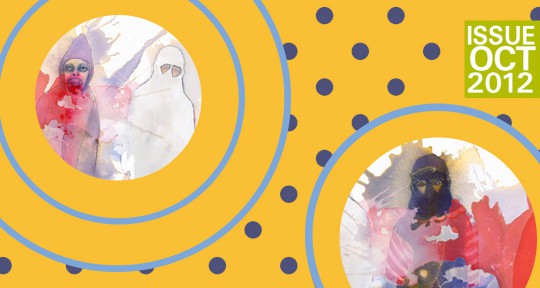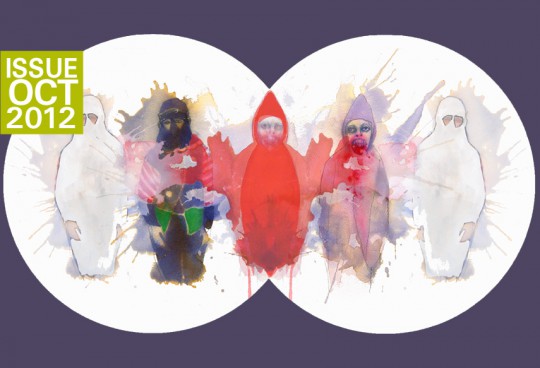Michael Henry Heim, the translator who introduced to English readers Milan Kundera’s The Unbearable Lightness of Being—and my personal favorite, The Joke—dies on 29 September 2012. Not only do we mourn his passing, we regret not being able to publish the interview Heim agreed to months before. Michael Stein of Literalab, who has been researching interview questions for Asymptote when news breaks of Heim’s death, writes a tribute instead, which we publish on Tumblr (this being before the arrival of our blog). On the other hand, Yiyun Li—whom I have been courting since the beginning of Asymptote—finally agrees to grace the pages of our eighth issue (listen to a snippet of her conversation with Clare Wigfall here). Haven’t read Li? Start with “Love in the Marketplace” from A Thousand Years of Good Prayers. Sometimes, in my more indulgent moments as editor, I think of that story and channel the question that the narrator asks of her mother, who prides herself on the care she takes to make the very best hard boiled eggs that she has been selling for forty years: Who even notices?
The Fall 2012 issue was the first issue of Asymptote that I encountered when I decided to reconnect with literature after a long hiatus. And I’ll be perfectly candid: as a skeptic who has never been afraid of ghosts, I was somewhat bemused by the Halloween-tinged theme of fear and the supernatural. But when I delved a little deeper I found no Disneyfication of the old pagan ritual but rather an exploration of fear that encompassed both the everyday and the extraordinary. In a whirlwind blend of poetry, fiction, loud-mouthed drama, and even phantasmagorical art, readers encounter the ghosts of of memory, AIDS, old age, Alzheimer’s, lost cultural identity, and so much more.
The pieces from this issue play off of each other’s fears and discoveries so well that it is almost uncanny. Afzal Syed Ahmed’s poem, which begins “In your language every line begins from an opposite end,” responds to Aamer Hussein’s fear of returning to a ‘home’ that no longer feels like home—and not simply because both are translated from Urdu. As Hussein explains, “I’m losing my mother tongue. I’m a vagabond, I carry my home on my back. Now I shall turn this foreign tongue into a whip and lash them with their words.” When discussing in her interview why she doesn’t feel ready to be translated into Chinese, Yiyun Li demonstrates a similar fear of losing one’s language, of being misinterpreted, of being pushed out or forgotten.
But alongside the angst there are also moments of poetic playfulness and joy. “Behold our anxieties—the exhilaration of our loves, as well,” exclaims Marie-Claire Bancquart. At that time I was an aspiring poet, and I particularly enjoyed the way language itself became a place of exploration and chance encounters, in both the translations and in the Special Feature on English poetry. Who could resist the words invented by Lutz Seiler—birdcough, telephonerustle, brizk dettloff kaatz? Elsewhere, the dream-like atmosphere created by Gerard Beirne’s poetry seems to be a full fledged exercise in Orientalism, given that it contains references to harems, Turkish beauties, flying carpets, coffee houses, gold leaf, velvet, and clasps of silver. But if you look more closely, he instead depicts a sinister world where those Turkish beauties ingest quicksilver in the pursuit of comeliness, poisoning their minds and bodies to please the Western world.
It is difficult to single out pieces from this issue, but three in particular resonated with me. And they are somewhat surprising choices for this skeptic.
The first was the chilling reduction of humanity to arthropods in Chang Hui Ching’s War Among the Insects, translated by Lee Yew Leong. Combining current pop culture references including Hello Kitty and Sex and the City with the history of the Qin dynasty and the Warring States period, the author portrays the paranoia of the early Chinese Imperial Court. The daily fear of being ousted, replaced, or poisoned makes people behave like wasps in a nest, while their external enemies are like swarms of locusts. Blurring past and present and juxtaposing the banal with ancient lore, the narrator mentions silent films, animal sacrifices, and mediumship in almost the same breath, creating the impression of a world parallel to this one:
Some say life and death are blurred. It’s possible to die without realizing it. No voice has ever returned from that place. The dead leave behind their voices. Their voices echo back and forth in the valley of the dead, waiting for the arrival of those they had stood up in their past lives. There, there’d be no other place to go; one would not miss one’s appointments.
This communication with the world of spirits is further pursued in my second choice: an excerpt from The Ghosts of Berlin, a non-fiction work by German journalist Sarah Khan translated by Jane Yager. Ostensibly a straightforward account of the supernatural encounters this reporter deliberately sought out in Berlin in 2009, it soon turns into an examination of the troubled history of a nation. Berlin—the city of Stolpersteine, Stasi spies, Cold War shenanigans, people being taken to forced labour camps for decades under several different regimes—is full of ghosts and painful memories. Khan’s stories of haunted buildings, outraged spirits and the people who tend to them weaves a tight plait of the historical, political, and paranormal. It is also an attempt to preserve authenticity in a city on the cusp of over-modernisation and trendification.
The fear of having history rewritten or lost and the paranoia of living under a dictatorship both haunt my third choice: three poems from three very different periods in the life of Arseny Tarkovsky, the father of the famous Russian filmmaker. Tarkovsky survived the Stalinist purges because he had translated some of Stalin’s early poems from Georgian, but for a long time he was silenced, with only his translations being allowed into print. Despite the grimness of his reality, and despite the reputation for unhappiness and misery of Russian literary tradition, his own verse nevertheless exhibits a visionary sensibility and musicality that translators Philip Metres and Dimitri Psurtsev do a wonderful job of conveying.
In “The Cricket,” Tarkovsky identifies with the secret voice from above the hearth, and seeks to remind travellers or soldiers fighting the war of home and their beloved Russian consonants. Yet, in a paranoid Soviet state, this could be interpreted as the voice of conscience or that advises insurgency to support an impending counter-revolution:
I’ll rouse the whole house:
I’m the night watchman. Arise!
Your people across the river
will trumpet their reply.
“My sight, which was my power…,” the last of the three poems translated by Philip Metres and Dimitri Psurtsev, describes yet another fear that runs through many of the works featured in this issue: the fear of aging and of death. It is one that can only be resolved through learning how to die with ease:
My sight, which was my power, now blurs
Two invisible diamond spears;
My hearing subsides, full of ancient thunder
And the breathing of the house of my father.
We find echoes of this sentiment—perhaps the source of such ancient thunder—in the plaintive yet humorous lament, written two thousand years ago, of the Greek poet Alcman:
I’ll never dance again
with sweet-voiced girls:
my knees just shake
underneath me.
Yet even in this issue about acknowledging our deepest fears, there is still an optimistic note to end on. Via Buğra Giritlioğlu, Turkish poet Murathan Mungan describes how the soul, despite being crushed by repeated partings, learns to rebuild itself. Age polishes the rough corners of suffering and inures us to it. Details might lose their magic but also their pain as “objects turn docile with time.” You learn how to prune your fears like shoots that sprout in the wrong place and “with time nothing hurts any longer as it used to.”
Far from scaring me then, this first encounter with a Halloween-infused issue of Asymptote reconfirmed my love for poetry and translated literature, giving me a faint glimmer of hope that I, too, might one day write something worth publishing. An apparition worth clinging to, one might say.
Marina Sofia has been a Marketing Manager at Asymptote since September 2017.
If Asymptote also reconfirms your love for translated literature, why not join us as a sustaining member today?
*****
Read more from our #30issues30days showcase:


